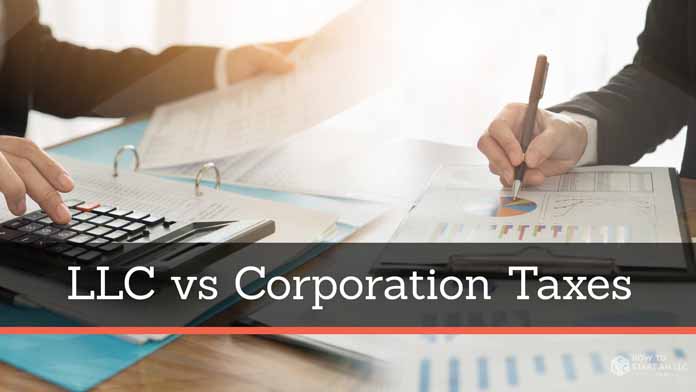LLC vs Corporation Taxes
LLCs offer pass-through taxation which is ideal for almost all small businesses.
A corporation’s tax structure is beneficial only when a small business must rely on investors.
Our LLC vs Corporation Taxes guide provides a detailed comparison of both business structures.
If your small business doesn’t need funds from outside investors, visit our free Form an LLC guide or our What is an LLC guide to take the next steps.

C Corp vs LLC Taxes
The Basics
While several business structures are considered separate entities from their owners for legal purposes, the C corporation is the only structure that is also considered separate for tax purposes. This means that corporations must pay their own income taxes on all profits that cannot be deducted as business expenses. These taxes will apply both to profits kept in the company as retained earnings and profits paid to shareholders as dividends.
A corporation can reduce its taxable earnings by deducting business expenses. This includes money used toward start-up costs, operating expenses, and advertising. A corporation can also deduct salaries, bonuses, and the cost of employee benefits.
C corporations must file a corporate tax return and pay the corporate tax rate of 21% on all taxable earnings. If a corporation will owe taxes, it must estimate the amount of tax due for the year and make payments to the IRS on a quarterly basis.
Any owners or shareholders who perform work for the company receive salaries and bonuses like all company employees. Since these are deductible business expenses, they are only taxed once, on each shareholder’s personal return.
Double Taxation: Paying Dividends
Since a C corporation is the only business structure to pay corporate taxes, it is also the only structure subject to double taxation. All taxable corporate profits, whether used for company expenses or distributed to shareholders as dividends, are taxed first at the corporate tax rate.
Once a shareholder receives a dividend distribution, however, they are also liable for individual income taxes on that amount. This means that any money paid out as dividends is taxed twice, both at the corporate and individual level.
One way to avoid the double taxation of dividends is to register your business as an S corporation. Unlike C corporations, S corporations are taxed as pass-through entities, meaning all profits pass through to the shareholders where they are only taxed once, at each individual’s personal tax rate.
Taxation on Retained Earnings
Retained earnings are the remaining profits after the corporation covers all of its expenses and distributes profits to shareholders and owners. While these earnings are subject to corporate taxes, they are exempt from additional taxation until they are distributed as salaries, bonuses, or dividends.
These earnings are generally used to purchase supplies and equipment for the company or increase the stock value of the corporation before selling. Both C corporations and S corporations can retain earnings to lower their overall tax liability.
While C corporations will still need to pay corporate taxes on their retained earnings, they can avoid the double taxation of dividends by not distributing their entire profit to shareholders. Since S corporations are not subject to corporate taxation, retained earnings can be held in the corporation completely tax free.
Of course, the IRS places limitations on how much money can be left in your C corporation, with most able to keep up to $250,000 in retained earnings without risking penalties.
C Corporation vs. S Corporation Taxation
A C corporation refers to the traditional corporate structure, but some businesses may elect S corporation status. While they share many characteristics such as their filing requirements, limited liability protection, basic structures, and corporate formalities, these two entities are taxed much differently.
An S corporation pays taxes like a partnership or LLC, with all profits being reported on the owners’ personal income tax returns. This means that S corporations are not subject to corporate taxes or the double taxation of dividends. Another advantage of S corps is that owners can save money on employment taxes by distributing their earnings to members and passive shareholders.
The decision to elect S corporation status will generally come down to which option is more financially beneficial to you and your business. With the recent reduction in the corporate tax rate to a flat rate of 21%, more businesses may benefit from paying the corporate rate rather than their personal marginal tax rate. This is a decision that should be made with the help of a tax professional.
Have a professional service form a C-Corp
Recommended: ZenBusiness
LLC Taxes
The Basics
Just like a corporation, an LLC is considered a separate entity from its owners, known as members, for legal purposes. However, when it comes to taxation, an LLC and its members are one and the same. Just like S corporations, the IRS considers LLCs pass-through entities. In practice, this means that LLCs are taxed in the same way as sole proprietorships or partnerships, with all profits and losses passing through the business to the members.
Rather than receiving paychecks, LLC members are paid through withdrawals or distributions from their capital accounts, which contain each member’s share of business profits. These distributions are not subject to state, federal, or employment taxes at the time of distribution. Instead, LLC members are responsible for paying quarterly estimated taxes on all capital distributions and for reporting these earnings as business income on their personal tax returns.
The Tax Cuts and Jobs Act of 2017 included a 20% income tax deduction for all pass-through businesses up to a certain threshold. LLC members can also deduct legitimate business expenses such as start-up costs, transportation and travel expenses, equipment and supply costs, and the costs of advertising.
As far as state taxes are concerned, the majority of states follow the federal government when it comes to LLC taxation. Some states, however, levy separate annual taxes on the LLC itself. Be sure to check with your state filing agency for your specific state tax requirements.
Self-Employment Tax
As pass-through entities, LLC members are considered self-employed by the IRS. Because they do not receive paychecks, LLC earnings are not subject to employment taxes at the time of distribution. This means that in addition to paying state and federal income taxes on their earnings, LLC members are also responsible for covering their Social Security and Medicare contributions at tax time.
The federal government currently collects 15.3% of business earnings to cover these programs. Traditionally, business owners and employees split this amount. However, since LLC members are not considered employees and are not issued paychecks, each member is responsible for the full 15.3% of their earnings — both the employee and employer share of the tax burden. The employer portion of this amount can be deducted for income tax purposes.
LLC Tax Flexibility
While the majority of LLCs stick with the default pass-through taxation, one major benefit of this business type is the flexibility to be taxed as a corporation if this classification is beneficial to you and your business.
Being taxed as a corporation may offer some appealing benefits to certain LLCs. For one, electing to be taxed as a corporation can provide additional protection to single-member LLCs that find it difficult to maintain their business as a separate entity. Filing taxes as a corporation provides a solid distinction between you and your business. This can serve to fortify your limited liability protections should they ever be threatened.
Additionally, corporate taxation can offer strong financial benefits to some LLC members depending on their personal income. With the corporate tax rate of 21% falling well below the top three individual income tax rates — 32% to 37% — having LLC profits taxed at the corporate rate may be an attractive option. While dividend taxes and other liabilities may erode this advantage, all LLCs should explore which taxation option is best for them.
Employee Taxes
Any business with employees is faced with a number of additional tax requirements beyond those associated with your business profits. This is true for both corporations and LLCs. Some taxes are withheld from employee paychecks and submitted to the IRS and state tax authorities, while others are paid directly by the business.
As an employer, you must withhold federal income tax, state income tax, and the employee portion of Social Security and Medicare (FICA tax) from every employee’s paycheck and deposit these withholdings to the proper agencies. You will be required to deposit federal income taxes and the employee and employer portion of FICA taxes to the IRS on either a monthly or semi-weekly basis.
Your reporting schedule is determined by the amount of employment taxes you reported two years prior to your current filing (referred to as the lookback period). Those who reported less than $50,000 are required to deposit their employment taxes each month. Those who reported more than $50,000 will need to deposit these funds within about a week of each paycheck issued to their employees.
In addition to these withholdings, businesses with employees are also responsible for federal unemployment taxes (FUTA). These taxes are paid on the first $7000 in wages paid to each employee each year. This amount is paid on a quarterly basis until the threshold is met.
State employment tax requirements will vary, so it is important to review state regulations to ensure compliance with all state tax liabilities.
Which Business Entity is Right For Me?
There are many considerations to be made before deciding to form your business as an LLC or a corporation. The tax requirements of each structure can play a big role in determining which business type will work best for you, your business, and your future goals.
You can start by asking yourself some important questions, including:
- How many owners will your business have?
- Will your business hire employees?
- How much capital do you need to raise to get started?
- How much profit do you expect to make in the short and long term?
- What is your personal income and your business partners?
- Do you plan to work directly for your business or simply oversee its operations?
The answers to these questions can help you determine which business structure will be most favorable when it comes to taxation. However, choosing the right business structure for your venture will ultimately come down to more than just taxes. Taking the time to understand the full implications of each structure will help ensure you make the right choice for your particular business.


